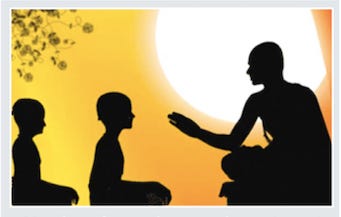Return to the Deep
An avalanche of 40 to 50-year-olds are waking up to the ancient wisdom of their ancestors. Though many are children from around the world, the Bharatiya children -- now in their physically middle-aged bodies -- are reaching forward into the tools of the past. They are realizing that the school teachings that allowed them to make large incomes and create stable homes for their families, and the education that allowed them to follow their dreams, was largely a machine for commerce. Most of it is not vidya, true knowledge.
Much of modern education in prestigious universities today is in fact a product of the mole of imperialism planted a century ago and still producing fruit. It denies true knowledge by purposeful misinterpretation of wisdom as religion. It villifies religion, even though the imperialist countries of today are very much subversively religious and evangelistic.
If people are blind followers of the sector of society that gave them a good life, they ask only those questions pertinent to their next need, for food, for money, for a desired luxury. Our electronic toys and cars and luxury items are meant to keep us busy, to feel fulfilled so that we support the system that provides it for us.
As people get older and start to think independently, they should find themselves asking questions. If they have values for particular social issues, what are they doing to consciously choose how their money is spent? Most modern people who are not deeply connected with their environment are not spiritual. They are disconnected with what is happening to their colleagues, the people who serve them food, the people whose services allow them to live comfortably. The less they know, and the more remote they are, the less responsibility they need to have. If they are disconnected with what is happening to animals, the ocean, the forests, need not wonder where they plasticware, glass bottles, and unrecycled trash actually goes.
Worldwide groups are searching for ways to build green economies, to reduce carbon footprints, and to save water. They high-tech solutions and their inventions of new technologies are missing a key element -- how our ancestors managed to preserve the environment. Just 100 years ago, people paid to throw out containers, so they recycled every glass bottle, every metal container, every paper. They did not utilize so that they need not need to reuse.
For millenia, Indians weaved leaves with sticks to make bowls and plates, used leaves as toilet paper, planted trees for birthday events, recycled clothing from curtains or used them as rags, and found ways to use every part of whatever they harvested. They had rituals that involved all of society to ensure everyone's participation. For birthdays, instead of blowing OUT the light on a cake brought in with a cardboard box, light was created by igniting a cotton wick in a earthen pot of old oil and placing the deep in front of a holy place in honor of that holy part inside ourselves that is aligned with the Universe. The deep was also a reminder that our eyes should not take in bright lights at night, and that a small deep was enough.
The tools of the past still work today, but we have been taught by the west to see these practices as primitive, poor, and time laborious. Modern means blindly adopting the new, the fresh, and the latest. Returning to ancient land practices however could change the course of destruction of our environment. But are we ready to start eating with our hands, washing our private parts with water instead of using paper, and use less disposable items?
As people age, they also remember their childhood and how their elders lived. If they begin to suffer from illnesses, they remember what their grandparents did at the same age. Indians may well remember herbal remedies, yoga poses, special foods used as medicine, seasonal rituals, and daily routines that seemed to improve their elders' health. And then they wonder whether such rituals would help them. This is the beginning to the return to tools of the past that are vidya.
week 111. TheSouthAsianTimes
Download the .pdf version of this column by clicking on the image.
Dr. Bhaswati Bhattacharya is a Fulbright Specialist 2018‐2023 in Public Health, a family physician in the Department of Medicine at Weill Cornell Medical College in New York, NY, and holds doctorates in pharmacology and Ayurveda. She teaches ayurvedic nutrition on global platforms and cleans her channels regularly with sesame oil, mustard oil, and ghee.
Her bestselling book Everyday Ayurveda is published by Penguin Random House.
To order an autographed copy, write to bhaswati@post.harvard.edu.
To learn more, visit www.drbhaswati.com







